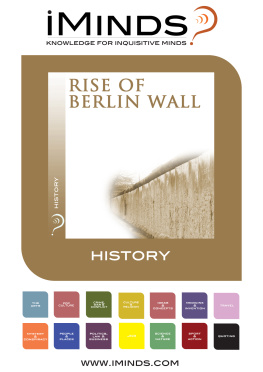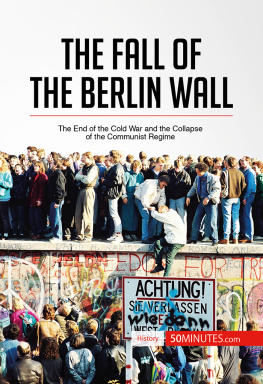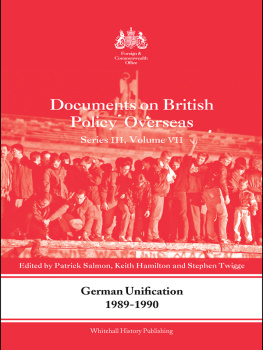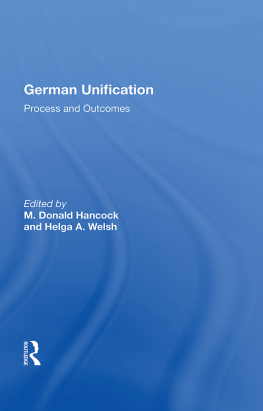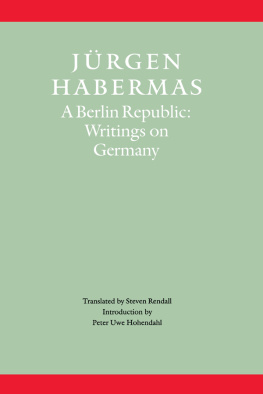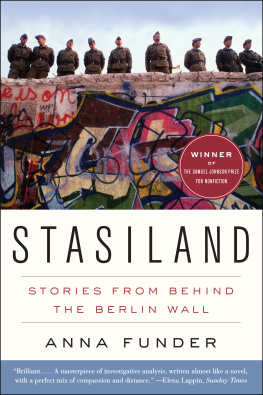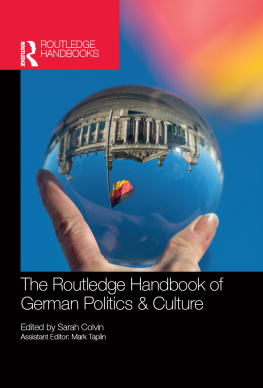Published in 2010 by
Berghahn Books
www.berghahnbooks.com
2010 Berghahn Books
All rights reserved. Except for the quotation of short passages for the purposes of criticism and review, no part of this book may be reproduced in any form or by any means, electronic or mechanical, including photocopying, recording, or any information storage and retrieval system now known or to be invented, without written permission of the publisher.
Library of Congress Cataloging-in-Publication Data
A C.I.P. record of this book is available from the Library of Congress
British Library Cataloguing in Publication Data
A catalogue record for this book is available from the British Library
Printed in the United States on acid-free paper
ISBN: 978-0-85745-221-4
CONTENTS
Jeffrey J. Anderson
Konrad H. Jarausch
Charles Maier
A. James McAdams
Eric Langenbacher
Ruth Hatlapa and Andrei S. Markovits
Bradley Prager
Dagmar Herzog
Joyce Marie Mushaben
Hilary Silver
Myra Marx Ferree
Jeffrey J. Anderson
Russell J. Dalton and Willy Jou
Helga Welsh
Beverly Crawford
Abraham Newman
Holger Wolf
Stephen J. Silvia
Anke Hassel
Richard Deeg
Christopher S. Allen
Eric Langenbacher
Anniversaries are occasions for gift-giving, and so we would like to take this opportunity to express our sincere thanks to those who gave liberally of their time and creative energies in order to bring this initiative to a successful conclusion. First, we would like to thank our contributors, many of whom came together at Georgetown University in May 2009 to present works-in-progress and to share ideas about how the essays might be improved and extended. The May workshop would not have been possible without the care and attention of Katherine Carta, Stacey Hall, and Christina Ruby of Georgetown Universitys BMW Center for German and European Studies. We also thank Marion and Vivian Berghahn, Martha Hoffman and Ann Przyzycki for their expert advice and guidance in the various editorial and publishing phases. Finally, we would like to thank each other for establishing an editorial partnership and intellectual exchange that made this venture truly enjoyable from the start.
Jeffrey J. Anderson & Eric Langenbacher
August 2010
INTRODUCTION
Jeffrey J. Anderson
Continuity through Change
Tis the season of anniversaries in Germany. 2009 unfolded like a hit parade of history. March ushered in the sixtieth anniversary of the founding of the Federal Republic and May witnessed the sixtieth anniversary of the end of the Berlin Blockade. After a summer lull, the seventieth anniversary of Nazi Germanys invasion of Poland fell on 1 September and in October, the twentieth anniversary of the first Monday demonstration in Leipzig took place. Finally, the month of November offered up a major datethe twentieth anniversary of the fall of the Berlin Walland a lesser one, suited more for the political connoisseur: the fortieth anniversary of the Social Democratic Partys (SPD) ratification of the Godesberger Program. 2010, of course, culminates in October with the twentieth anniversary of unification.
This string of national anniversaries is intertwined with a broader fabric of European remembrance. In 2008, Germans and their neighbors celebrated the fiftieth anniversary of the signing of the Treaty of Rome, which launched the comprehensive European integration project that has culminated in the European Union. And just over a year from now, in 2011, Europe and the rest of the world will observe the twentieth anniversary of the collapse of the Soviet Union, which marked the formal beginning of the post Cold War era, a period that is still taking shape. Both of these developmentsthe quest for European unity and the broader East-West conflicthave been central components of the narrative of recent German political development. Taken together, this list of anniversaries reads like an out-of-sequence capsule of modern Germany historythe plunge into the abyss of world war; the slow path to redemption through democracy; the hardening of the Cold War and the division of Germany; the embrace of a great political consensus around the social market economy; the yearning for change in the other part of Germany; the beginning of the end of division.
An anniversary can be a time of celebration, an occasion to tally up accomplishments and successes. Yet, it can also be a wistful time, laced with nostalgia and disappointment over opportunities lost and roads not taken. Whatever the dominant mood, an anniversary is a time for remembering, for searching ones personal and collective memories, and for thinking about how the past informs the present and future. Twenty years ago, Germans were in a reflective frame of mind, having just observed the fortieth anniversary of the inauguration of their postwar democracy. In the days and weeks following the breaching of the Berlin Wall, many Germans (and not a few of their neighbors) drew on memories to predict a weakening of democracy at home, and an eventual parting of ways for Germany and its European neighbors. These critics feared that unified Germanys political future would be patterned on its dismal prewar past. Their pessimism looked on four decades of peace and prosperity in West Germanyjust months earlier, the Federal Republic had celebrated the fortieth anniversary of its foundingas an interlude of sorts, one whose end would see the country gravitate back toward an aggressive, unattached, and realist foreign policy. Germany would soon seek to hoist its western anchor, and chart its own way in Mitteleuropa; some pundits even forecasted a drive for nuclear weapons. Suffice it to say that the intervening twenty years revealed that the power of these historical memories and prognoses based on them have waned considerably.
In 1989, there were many who maintained that a more contemporary set of historical memories, drawing on the Bonn Republics formula of stable democracy, social market economy, and membership in Western European and transatlantic networks, would have a tonic effect on a unified Germany. The strongest and most self-confident of these arguments were directed at the domestic formula for unification. Any notion of a third way, entailing a search for a blend of the best that both Germanys had to offer, was soon swept aside in favor of a wholesale transfer of western law and institutions to the east. This process was both comprehensive and rapid, and sprang from a firm belief on the part of West German elites and mass public that their system had proven itself over the past four decades and was capable of quickly stabilizing the east


